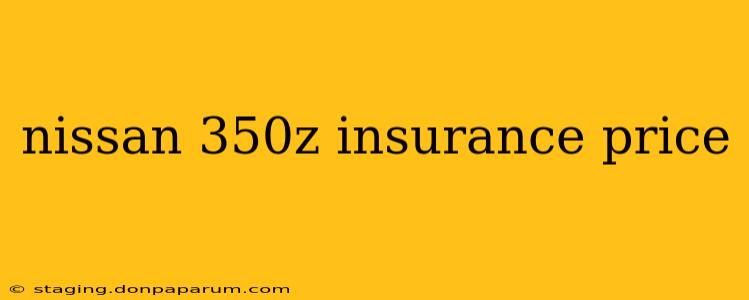The cost of insuring a Nissan 350Z can vary significantly depending on several factors. This guide will break down the key elements influencing your insurance premium, helping you understand what to expect and how to potentially lower your costs.
Factors Affecting Nissan 350Z Insurance Costs
Several factors contribute to the final price of your Nissan 350Z insurance. Understanding these will help you get a clearer picture of what you might pay.
1. Your Driving Record: The Most Significant Factor
Your driving history is arguably the most influential factor in determining your insurance rates. A clean driving record with no accidents or tickets will significantly reduce your premiums. Conversely, accidents, speeding tickets, or DUIs will drastically increase your costs. Insurance companies view risky drivers as higher liabilities.
2. Age and Experience: Youth vs. Maturity
Younger drivers, especially those under 25, typically pay higher insurance premiums due to statistically higher accident rates. As you gain more driving experience and reach older age brackets, your rates generally decrease.
3. Location: Urban vs. Rural
Where you live plays a crucial role. Urban areas with higher crime rates and traffic congestion tend to have higher insurance premiums than rural areas. The likelihood of accidents and theft is a major factor considered by insurance companies.
4. Coverage Level: Balancing Protection and Cost
The type and amount of coverage you choose directly impact your premium. Comprehensive and collision coverage are more expensive but offer broader protection. Liability-only coverage is cheaper but offers less protection in case of an accident. Consider your needs and risk tolerance carefully when choosing your coverage level.
5. Vehicle Modifications: Performance Upgrades and Insurance
Modifications to your Nissan 350Z, especially performance upgrades like engine modifications or aftermarket parts, can significantly increase your insurance premium. These modifications often make the car more expensive to repair and increase the risk of accidents. Always inform your insurance provider about any modifications you make.
6. Credit Score: A Surprising Influence
In many states, your credit score can surprisingly impact your insurance rates. Insurance companies often use credit scores as an indicator of risk. A good credit score can lead to lower premiums, while a poor credit score may result in higher ones.
Getting the Best Nissan 350Z Insurance Rate
Now that you understand the factors influencing your insurance costs, here are some tips to help you secure the best possible rates:
1. Shop Around and Compare Quotes
Don't settle for the first quote you receive. Compare quotes from multiple insurance providers to find the most competitive rates. Use online comparison tools or contact insurance agents directly.
2. Consider Bundling Policies
Bundling your car insurance with other types of insurance, such as homeowners or renters insurance, can often lead to discounts.
3. Maintain a Clean Driving Record
This is the single most effective way to reduce your insurance costs. Drive safely, obey traffic laws, and avoid accidents and tickets.
4. Explore Discounts
Many insurance providers offer discounts for various factors, such as good student discounts, safe driver discounts, and multi-car discounts. Inquire about available discounts to see if you qualify.
5. Increase Your Deductible
Increasing your deductible (the amount you pay out-of-pocket before insurance kicks in) will typically lower your premium. However, weigh the cost savings against your ability to afford a higher deductible in case of an accident.
Conclusion: Understanding Your Nissan 350Z Insurance Costs
The cost of insuring your Nissan 350Z is multifaceted, influenced by a combination of your driving record, age, location, coverage level, modifications, and credit score. By understanding these factors and taking steps to manage them, you can secure the best possible insurance rate while ensuring adequate protection. Remember to shop around, compare quotes, and maintain a clean driving record for optimal savings.

